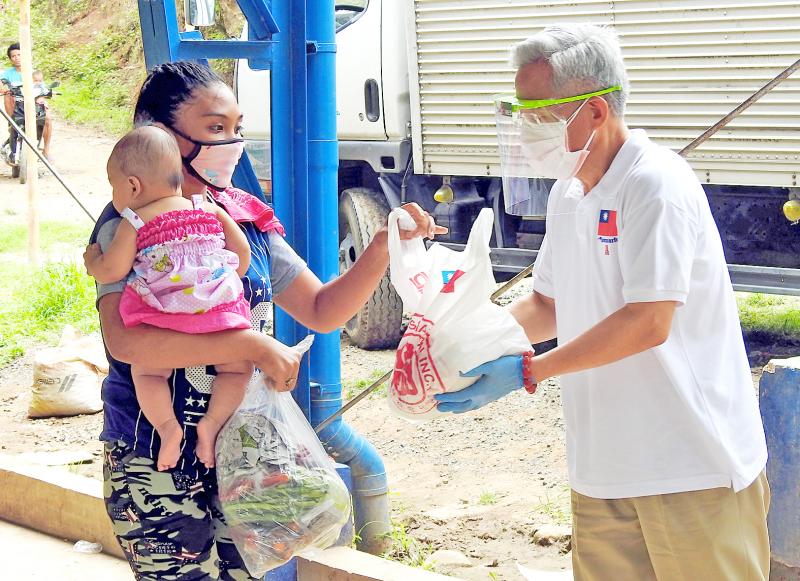Taiwan had as of the end of last month donated about 10,980 tonnes of white rice to countries suffering from food shortages amid the COVID-19 pandemic.
Prices of white rice around the world have fluctuated greatly, as border controls and lockdown measures implemented by nations to curb the spread of the virus have affected the global food supply chain, Agriculture and Food Agency Deputy Director-General Juang Lao-dar (莊老達) said on Tuesday.
With a sufficient national grain reserve, Taiwan plans to donate a total of 36,410 tonnes of white rice to 16 nations this year, including its diplomatic allies Haiti, Honduras, Nicaragua and Eswatini, as well as African countries affected by food shortages, Juang said.

Photo: CNA
The donations are part of Taiwan’s international humanitarian efforts, which have been ongoing for 18 years, to help nations suffering from grain shortages due to poverty, hunger or major disasters, he said.
The agency — which collaborates with the Ministry of Foreign Affairs, and non-governmental organizations such as the Buddhist Compassion Relief Tzu Chi Foundation — has helped more than 40 countries in Africa, Central and South America, Asia and Oceania with grain donations, he said, adding that the amount of white rice donated totals about 400,000 tonnes.
The donations were made after ensuring that they would not disrupt domestic supplies or the international trade order, he added.
Honduras has been highlighted in the government’s grain donation efforts, as it had suffered a drought-induced food shortage before a wide range of economic activities came to a halt amid the COVID-19 outbreak, Juang said, adding that the rice donations were a timely relief for the nation.
“Seeing white rice bags printed with ‘Taiwan Can Help’ being loaded into containers brings us an indescribable sense of joy,” said an anonymous staff member of the grain-processing operator that works with the government on humanitarian aid.
It has been an honor to assist with the international donations, as it not only helps those in need, but also raises the global profile of Taiwanese rice, they added.

A magnitude 4.9 earthquake struck off Tainan at 11:47am today, the Central Weather Administration (CWA) said. The hypocenter was 32.3km northeast of Tainan City Hall at a depth of 7.3km, CWA data showed. The intensity of the quake, which gauges the actual effect of a seismic event, measured 4 in Tainan and Chiayi County on Taiwan's seven-tier intensity scale, the data showed. The quake had an intensity of 3 in Chiayi City and County, and Yunlin County, while it was measured as 2 in Kaohsiung, Nantou County, Changhua County, Taitung County and offshore Penghu County, the data showed. There were no immediate reports of

Weather conditions across Taiwan are expected to remain stable today, but cloudy to rainy skies are expected from tomorrow onward due to increasing moisture in the atmosphere, according to the Central Weather Administration (CWA). Daytime highs today are expected to hit 25-27°C in western Taiwan and 22-24°C in the eastern counties of Yilan, Hualien, and Taitung, data on the CWA website indicated. After sunset, temperatures could drop to 16-17°C in most parts of Taiwan. For tomorrow, precipitation is likely in northern Taiwan as a cloud system moves in from China. Daytime temperatures are expected to hover around 25°C, the CWA said. Starting Monday, areas

A Taiwanese software developer has created a generative artificial intelligence (AI) model to help people use AI without exposing sensitive data, project head Huang Chung-hsiao (黃崇校) said yesterday. Huang, a 55-year-old coder leading a US-based team, said that concerns over data privacy and security in popular generative AIs such as ChatGPT and DeepSeek motivated him to develop a personal AI assistant named “Mei.” One of the biggest security flaws with cloud-based algorithms is that users are required to hand over personal information to access the service, giving developers the opportunity to mine user data, he said. For this reason, many government agencies and

Taiwan has recorded its first fatal case of Coxsackie B5 enterovirus in 10 years after a one-year-old boy from southern Taiwan died from complications early last month, the Centers for Disease Control (CDC) said yesterday. CDC spokesman Lo Yi-chun (羅一鈞) told a news conference that the child initially developed a fever and respiratory symptoms before experiencing seizures and loss of consciousness. The boy was diagnosed with acute encephalitis and admitted to intensive care, but his condition deteriorated rapidly, and he passed away on the sixth day of illness, Lo said. This also marks Taiwan’s third enterovirus-related death this year and the first severe